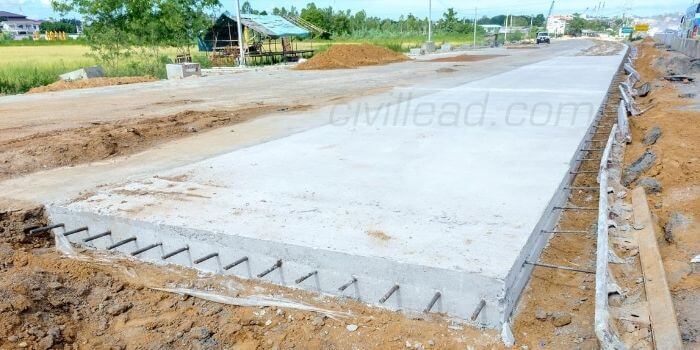Table of Contents
Concrete Road Vs Asphalt Road
The terms “Bitumen” and “Asphalt” are regularly used correspondingly to mean both natural and manufactured forms of the material.
Before discussing the difference between Concrete Road and Asphalt Road, we first need to understand what asphalt is and how it differs from bitumen.
What is Bitumen?
Bitumen is the binding agent that produced residue from petroleum distillation or is obtained naturally.
What is Asphalt?
Whereas asphalt is a mixture of black, sticky, viscous hydrocarbon material, coarse and fine aggregate produced in the plant. This composite mix is also known as asphalt concrete.
So let us discuss the differences between Concrete roads and Asphalt Roads.
Durability
Concrete roads are more durable than asphalt roads, whereas asphalt roads are less durable than concrete roads.
Effect of Weather
With varying water table levels and varying rainfall conditions across the Indian geography concrete road emerged as a more durable and sturdy option.
Since asphalt roads are known to get eroded by water, heavy rain and other extreme weather conditions damage the asphalt road, and the road needs to be repaired frequently.
Construction Speed
Construction of concrete roads requires machinery such as a concrete paving machine batching plant or concrete mixture, transit mixture, etc. Also, concrete takes more time for curing, and hence the speed of the construction is less compared to asphalt roads.
Whereas it takes less time to lay an asphalt road than a concrete road, there is no need to carry huge machines like the concrete mixture.

Resistance to Skid
During the rainy and winter season, vehicles tend to slip or slide on the concrete road due to rain and snow.
In comparison, asphalt roads increase road safety. They are skid resistance with better traction. There are fewer chances of accidents.
Tyre Noise
Concrete roads can be noisier because it is necessary during the construction to make them rough enough to provide a tyre grip.
However, it must be noted that the cause of the noise is not the concrete itself but the texture of concrete roads. It has been observed that transverse grooving results in a higher noise level and longitudinal grooving may help to reduce the noise level.
On the other hand, asphalt road provides a smoother and often quieter ride when relatively new.
Deflection
In the concrete road, the vehicle loads are transferred to subbase soil by the flexural strength of the pavement, and the entire pavement acts as a rigid plate. Dowel bars are provided at intervals so that there is no deflection of the slab due to the vehicle load.
In the case of asphalt roads, the vehicle load is transferred from grain to grain through the aggregates’ contact with the granular structure. Hence, during the rainy season, these roads are prone to seepage of water and potholes are formed due to the continuous traffic movement on all these roads.
Effect of Oil
Concrete roads do not get damaged by the leaking oil from the vehicle, whereas oil leaks can damage asphalt roads.
Fuel Consumption
As per a study conducted by Central Road Research Institute, the commercial vehicle may save up to 14% on fuel with the run on concrete roads. It is because the concrete road does not get deflected Under The Wheels of a loaded truck.
Whereas in the case of asphalt roads there is no such saving on fuel.
Ease of Repair
Concrete roads do not require frequent repair for patching work like Asphalt roads, but if the concrete road break, the whole corporate slab needs to be replaced.
On the other hand, asphalt is a cheaper and faster solution for short-term projects. Still, the repairs are sometimes just as extensive as concrete roads, with only ten years of life span. Asphalt must be relaid or repaired on a much more regular basis.

Maintenance
Concrete roads are maintenance-free, or we can say they require very minimum maintenance if they are correctly laid.
In contrast, maintenance of asphalt roads is easy. If part of the road is damaged, then it can be easily repaired, even it can be easily re-layered over the old layer.
Pollution
Concerning pollution, concrete is a better alternative than asphalt because its production generates less environmental pollution. It is also produced from readily available limestone. Also, cars running on concrete road provides better fuel efficiency.
Asphalt produces lots of highly polluting gases at the time of melting it for paving also Petroleum is required to produce asphalt, which is an expensive product.
Life-Span
It is estimated that good-quality concrete roads can sustain for 40 years, whereas asphalt roads last for around ten years.
Cost
Based on the initial cost of pavement, concrete roads are reported to be over 20% costlier than asphalt roads. However, your life cycle cost basis concrete roads are estimated to be around 20 to 25% cheaper than asphalt roads.
Whereas asphalt is still less costly as compared to concrete. Asphalt dries faster hence it takes less time to build an asphalt road than a concrete road.
Conclusion
Concrete roads can be a feasible option in areas where the weather conditions are adverse. And asphalt is ideal for rural roadways because of its low traffic, ease of maintenance and repair.
The ministry of road transport and Highways, the Government of India has decided to construct the national highway in cement concrete as a default option.
Even they are more than 20% costlier. However, on a life cycle cost basis, concrete roads due to their long life of 30 to 40 years and high durability concrete roads are estimated to be around 20 to 25% cheaper than asphalt roads.
Thus on a long-term basis, concrete roads are the most economical choice for pavement which provide long useful life.
Also, Read
What is WBM Road? Construction Procedure, Advantages and Disadvantages
Material Required For Construction of WBM Road
What is Camber In Road? – Purpose, Types, Advantages